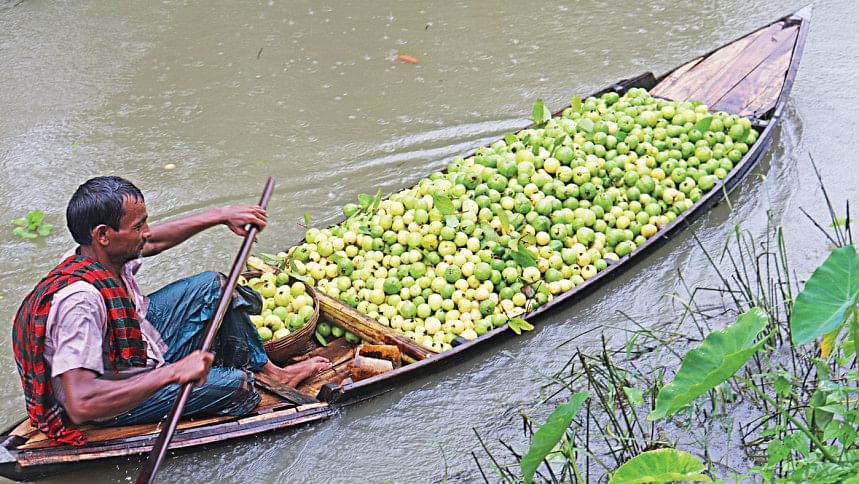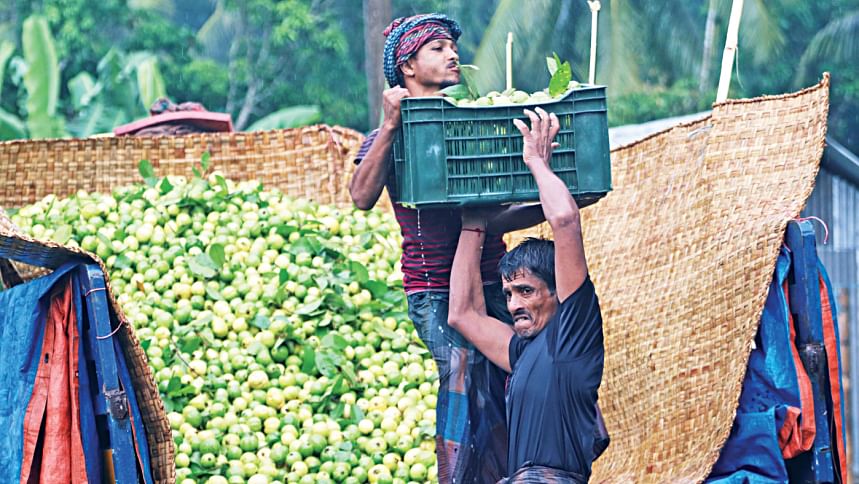Unfavourable weather affects guava production

Unlike previous years, guava farmers in four unions of the Pirojpur and Jhalakathi upazilas are unconcerned about getting the expected prices for their produce as the time needed to make shipments has decreased substantially thanks to the opening of Padma Bridge.
However, farmers are displeased with the current harvest of the seasonal fruit as they seem to be smaller than normal in size.
Farmers say they need at least 8 to 10 pieces of normal sized guavas to make up a kilogramme but this year, they are needing twice as many of the fruit for the same amount.
In addition, the guavas are of lower quality as most of them are covered in spots due to disease, they said, adding that inadequate rainfall during the growing season is to blame for the diminished size.
"Guavas swell after getting wet in rainwater but the rains came very late this year," said farmer Md Nazrul Islam, citing how there is inadequate precipitation even amid the ongoing rainy season.
Bhaben Mondal, another guava farmer, echoed the same and said small guavas have little demand as their quality is also lower than that of normal ones.
"So, if the weather would favour us, we could get double production from our orchards," said Bhabotosh Biswas, a guava grower and union parishad member of Atghar Kuriana union in Pirojpur.
Chapal Krishna Nath, an agriculture officer of Nesarabad upazila, said there was hardly any rain between April and May, when the guava trees needed a good amount of water to flower well.
Harvesting of the fruit usually begins in June but it was delayed by a month this year as they took longer to mature amid the lack of rainfall.
In July, rainfall has been low too. The southern coastal division Barishal recorded 713 milimetre rainfall from July 1 to July 26, which was 66 per cent below the normal average rains of 2,075 millimetre, according to the Bangladesh Meteorological Department.

Chapal went on to say that as the rainy season has begun, they expect the next batch of guavas to be healthier as the season will continue for two months more.
Guavas have been growing for about three centuries across Atghar Kuriana union, some parts of Jalabari union in Nesarabad upazila, and Kirtipasha and Nabagram unions of Jhalakathi sadar upazila.
After harvesting is complete, the guavas are transported by boats to different local wholesale markets, where buyers collect them for sale in other parts of the country, including the capital city.
At present, farmers can sell one maund (about 37 kilogrammes) of guava for more than Tk 500 but the price falls every year due to increasing production.
Still though, farmers expect fair price this year as it has become significantly easier and faster to transport guava all over the country thanks to the opening of Padma Bridge.
Currently, guava orchards are taking up 607 hectares of land in Nesarabad upazila and 530 hectares in Jhalakathi sadar upazila.
Md Mostafizur Rahman Talukder, principal scientific officer of the Regional Agricultural Research Station in Barishal, said they are aware of the fact that guava production has been poor this year.
"Because of hot weather the production of the fruit is being hampered," he added.
When the guava trees flower, white flies attack them and that creates spots on fruit while restricting its growth.
"So, we suggest farmers use pesticides to get rid of the problem."
He then said that farmers do not use fertiliser in their orchards and is another reason why production quality is declining.
Besides, if farmers use bagging method to grow the fruit, it would bring good results, he added.

 For all latest news, follow The Daily Star's Google News channel.
For all latest news, follow The Daily Star's Google News channel. 



Comments